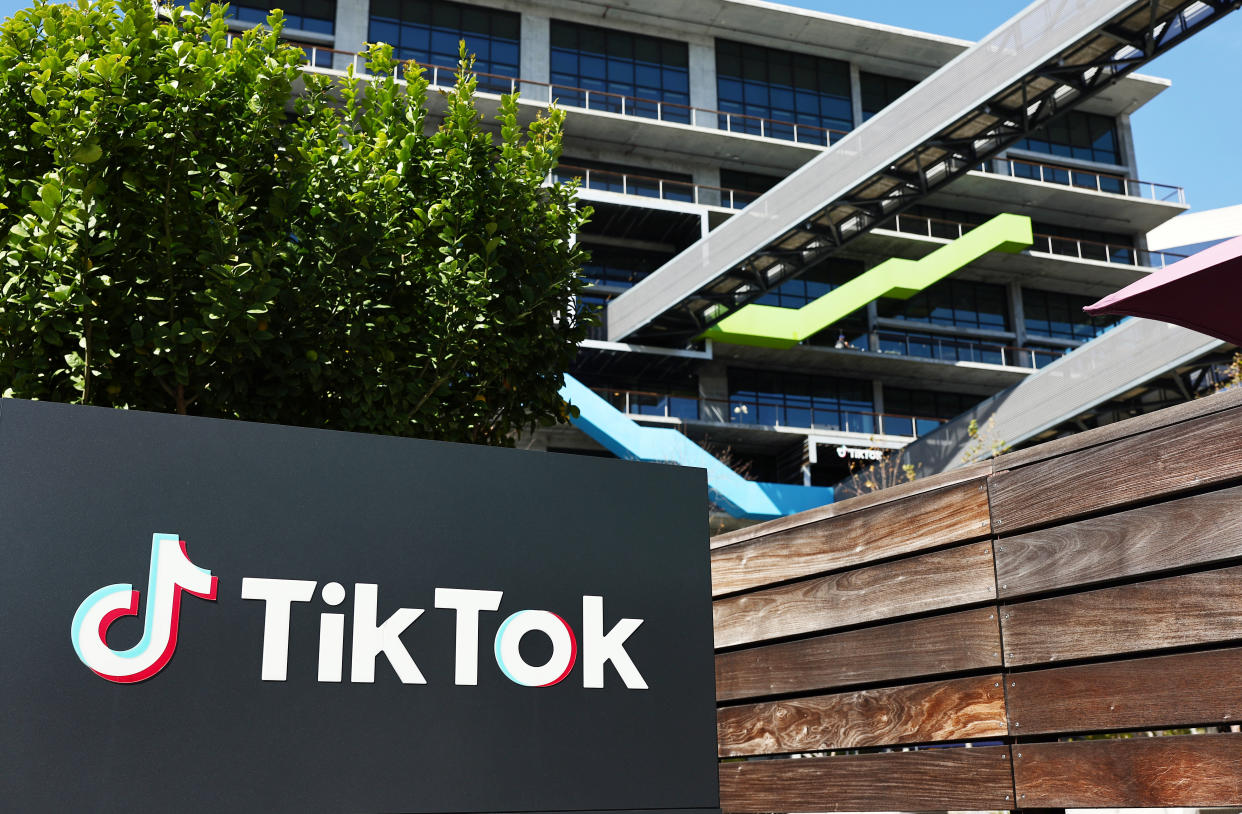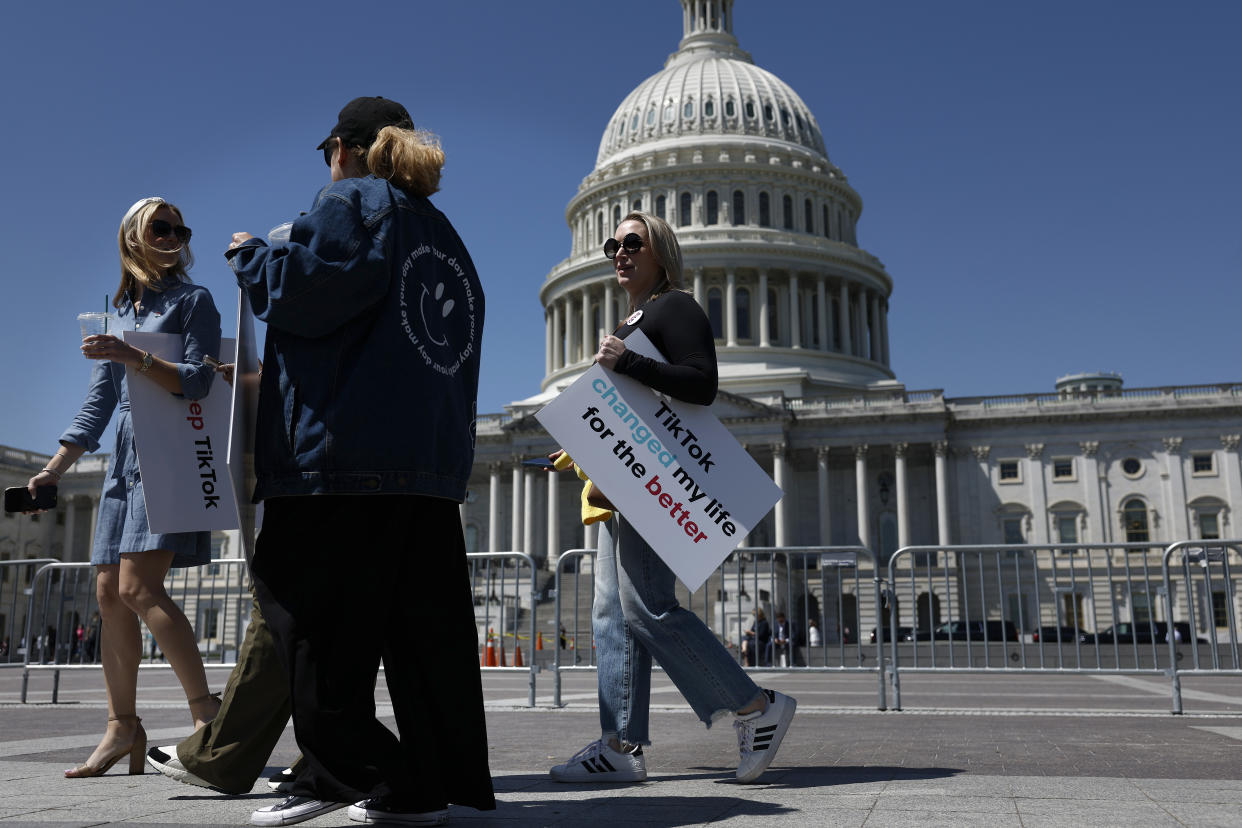A new law could ban TikTok in 2025. Here's what happens next.
President Biden signed a landmark bill Wednesday morning that gives China's ByteDance up to one year to divest TikTok or face a US ban on the app.
The long-debated measure is fraught with political implications for the 2024 election and will also kick off a complex set of steps over the coming 12 months likely to take place both in boardrooms and in courtrooms.
The bill gives the company 270 days to sell, but the president can extend the deadline up to a year. The process could end with a ban on an app that is currently used by more than 170 million monthly users in the US.
"This is another front in the ongoing US-China trade war that started during the Trump administration," Georgetown business professor Stephen Weymouth said in an interview this week.
He noted that the aggressive law will likely spur reactions from many fronts — including possible retaliation by the Chinese government. Previously, "Congress has had a relatively hands-off approach to tech regulation overall," he said.
The effort comes after lawmakers and the Biden administration have repeatedly charged that TikTok poses an urgent national security threat because the Chinese government could compel the company to share its data.
There are also concerns about the Chinese government’s ability to use the app to influence American public opinion by adjusting what millions of users see when they open the app.
"We hope that TikTok will continue under new ownership, American or otherwise," Sen. Mark Warner said on the Senate floor during the final debate. The Virginia Democrat, who is one of the effort's champions, added: "It just needs to be no longer controlled by an adversary."
The bill previously passed the US House 360-58 and then proceeded to Biden's desk with another strongly bipartisan vote of 79-18 in the Senate. The TikTok provision is part of a larger package of aid bills that will also send new funds to support Ukraine, Israel, and the Indo-Pacific.

The key question: Will ByteDance try to sell?
TikTok itself has denied the Biden administration’s charges and insists it would never share US data. It responded Biden's signing of the bill by charging that "this unconstitutional law is a TikTok ban, and we will challenge it in court."
TikTok and ByteDance have said previously that they have no intention of trying to sell adding Wednesday's statement that the law could "devastate seven million businesses and silence 170 million Americans."
But it's unclear if the company will change tack and look for buyers now that the law is on the books. By its own accounting, ByteDance is 60% owned by institutional investors who would have a powerful financial incentive to keep the app in front of the American market one way or another.
And there are potential buyers. Steven Mnuchin, who was Donald Trump's Treasury secretary, has publicly expressed interest and says he was assembling an investor group with the goal of making a bid.
What’s unclear is whether Mnuchin or anyone else would have the ability to raise the necessary funds. Dan Ives, a managing director at Wedbush Securities, has said the app could be worth "$100 billion-plus" if the underlying algorithm is included.
On top of that, even if the money and willingness to sell are there, it also remains an open question whether ByteDance could sell the algorithm even if it wanted to.

In recent years, China has exerted greater control by adding content recommendation algorithms to its export control lists. And China's Commerce Ministry has already said it "firmly opposes'' the idea of selling and that any deal "would have to seek government approval," according to a Wall Street Journal translation.
Without the underlying algorithm — often described as TikTok's "secret sauce" — the value of the app could fall precipitously, and buyer interest could dry up quickly.
"I don't envision a buyer who would be interested without some of that intellectual property," said professor Weymouth, adding, "a sale of the brand doesn't seem likely."
Another key front: The courts
The issue is also sure to end up in the courts. ByteDance has signaled it would sue to challenge the law, arguing that it could be overturned on multiple legal fronts.
One legal dispute could center around the First Amendment.
A recent analysis from the Economist Intelligence Unit predicted that free speech grounds could take a challenge to the law all the way to the US Supreme Court and could easily result in it being overturned, noting that the high court "is increasingly the ultimate decider of technology policy for the US."
Others agree. Congressman Ro Khanna of California — an opponent of the bill — recently told ABC, "I don't think it's going to pass First Amendment scrutiny because I think there are less restrictive alternatives."
He also reminded that a similar effort from then-President Trump to ban the app was also struck down in court.
"I doubt it survives scrutiny," he added.
Another front likely to be the subject of litigation is whether the bill unfairly targets a single company.
The final bill appears to have edited down direct mentions of the company but still directly names both TikTok and ByteDance in the legislation itself.
The app is termed a "foreign adversary controlled application" in the bill, an unusual move that could open it up to legal challenges under the legal concept of a "bill of attainder." The concept prohibits a party from being declared guilty of an offense without first going through the trial process.
"That is a problem," Mark MacCarthy of the Brookings Institution noted in a recent interview before the bill passed, saying there is established precedent against having a "legal consequence based on nothing other than your name."
This post has been updated.
Ben Werschkul is Washington correspondent for Yahoo Finance.
Click here for politics news related to business and money
Read the latest financial and business news from Yahoo Finance
